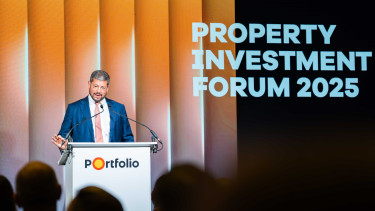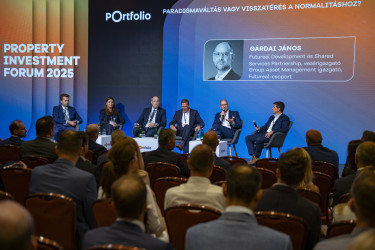The Hungarian real estate market is at a turning point




In his presentation, Steinberg emphasised that the investment market is shrinking, with transaction numbers falling by 50% across Europe as investors have become more cautious. Local markets are the strongest, as is the case with both the British and German markets.
Following this example,
it would be necessary for real estate market players in Hungary to create opportunities themselves, as there will be no external help to solve the problems,
Steinberg added.
He stressed that joint efforts are needed for the sector to develop and said he was confident that the coming period would be a successful one for the Hungarian real estate market.
Hungary could also be a major player in the region's investment market this year
Gábor Borbély, research director at CBRE, said that, although investors were somewhat cautious in April, the real estate investment market has since picked up again. Spain, Italy and Portugal are experiencing particularly strong growth.

He expects the Central European investment market to generate €12 billion in turnover this year. The Czech Republic is expected to account for one-third of this, with a volume of around €4 billion. Poland and Romania are expected to account for a further third, with a volume of over €4.5 billion. Hungary could also play a significant role in the remaining third, achieving a turnover of up to €800 million by the end of the year.
The role of domestic investors is definitely growing stronger in every country,
Borbély pointed out. In Hungary, for instance, the proportion of domestic capital is particularly high, at around 55%.
Like Steinberg, Borbély is also optimistic about the future.
According to expectations, we should be able to catch up with Western European growth rates in the coming years, and potentially even surpass them,
he added.
When will the Hungarian market become a real estate investment paradise again?
According to the participants of the Portfolio Property Investment Forum's executive panel discussion, domestic real estate investments are showing signs of recovery, but we cannot yet speak of a clear trend reversal. Experts say that the structure of the Hungarian market has changed significantly, with domestic real estate funds now dominating over foreign investors and adopting a long-term strategy.
In order to attract foreign institutional investors, there needs to be a reduction in country risk and a stable macroeconomic environment. Opinions are divided on the most promising investment targets. Some favour the hotel industry, citing Budapest's growing popularity as a tourist destination, where rooms are already selling at an average price of €120. Others see potential in A+ category office buildings.

Dr Dániel Ódor MRICS, a partner at Taylor Wessing, asked the participants about the perceived or real trend reversal immediately. What could be behind it, and should we trust the improving figures?
János Gárdai, the CEO of Futureal Development and Shared Services Partnership and Director of Group Asset Management, says that the outlook is positive and that there are still real estate investments that can perform well, even in a less favourable environment. However, this may require investment portfolios to be reconsidered.
According to Mátyás Gereben, MRICS and country manager of CPI Hungary, there is no crisis. However, he believes that the optimistic outlook should be tempered, despite the fact that the real estate investment market has grown compared to last year. The low base is a decisive factor here.
According to Lóránt Kibédi Varga, MRICS, the Managing Director of CBRE Hungary, although there are short-term trends that are cause for optimism, deeper factors, such as demographics, significantly nuance the picture. Hungary's population is declining by 40,000–50,000 people a year. In the long term, this will also impact economic performance, which will naturally affect the real estate sector.
Kata Mazsaroff, Colliers' Managing Director, agreed that the figures look better than they did a few months ago. However, she added that it is accumulated demand hitting the market rather than new players entering it. She added that only once a transaction volume of EUR 1.5 billion has been reached can we talk about a meaningful, stronger, more lasting and sustainable upturn.
According to Álmos Mikesy, the Chairman and CEO of Gránit Fund Management, it is still too early to identify any positive trends. Clearly, the bases are very low, so high growth is easily achievable. Having visited the region's capitals, it seems that there is still room for improvement.
Cover photo: Portfolio












